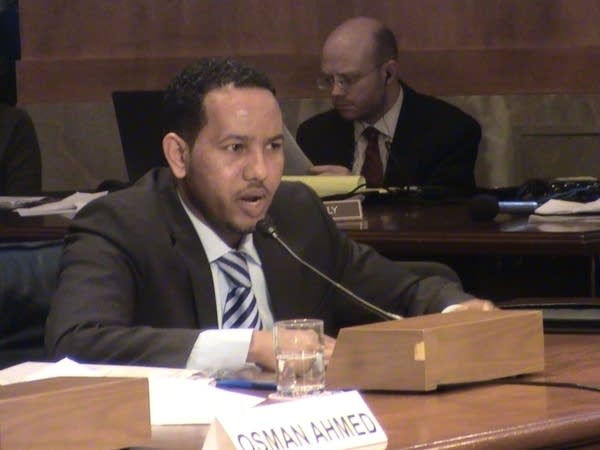Senate hearing explores Minneapolis-Somalia connection

The Senate Committee on Homeland Security and Governmental Affairs invited witnesses from Minneapolis to testify, along with experts from federal law enforcement and academia.
The big questions -- how and why a terrorist group in the Horn of Africa got recruits from Minneapolis -- were the center of the discussion.
Osman Ahmed's 17-year-old nephew Burhan Hassan disappeared last November. When asked by Committee chairman Joe Lieberman who recruited Burhan, Ahmed pointed to the mosques.

"These kids, especially my nephew, he was well-connected to the mosque. He doesn't have any friends outside," said Ahmed. "He used to go to school, home and the mosque. And there's no way he could get that idealogy from the school or home."
Create a More Connected Minnesota
MPR News is your trusted resource for the news you need. With your support, MPR News brings accessible, courageous journalism and authentic conversation to everyone - free of paywalls and barriers. Your gift makes a difference.
"So his family doesn't believe in this Islamist extremist ideology?" Lieberman asked.
"No way. No way," Ahmed responded.
Ahmed said his nephew called home from Mogadishu, but his family learned little about his activities.
The group he's thought to have joined is al-Shabaab, a militant Islamist force that controls much of Somalia. The FBI's Philip Mudd offered this glimpse of what awaits al-Shabaab's American recruits.
"Some get there and believe this is a place where Sharia law -- that is, the law of Islam -- is being practiced, and it's a great place to live and some of these folks will never come back," said Mudd. "Some get there and become cannon fodder... These folks aren't going over to become part of terrorist cells. A lot of them have been put on the front line, and some of them have been killed on the front line -- from the United States."

"Lastly, some are going over there and saying, 'Whoa, this is a serious war, there's serious lead flying,'" Mudd continued. "And they sort of lie, cheat and steal their way to get back, because they're in an environment where they say, 'I can't take this.'"
Another Minneapolis witness at the hearing was the youth program director at the Brian Coyle center in Minneapolis, Abdirahman Mukhtar.
Mukhtar knew some of the men who disappeared. He went to high school with Shirwa Ahmed, the Minneapolis man who blew himself up in a suicide bombing in Somalia last October. Mukhtar mentored another student who disappeared last November.
Mukhtar used his time with the senators to draw a portrait of the community the Somali men grew up in.
"The Cedar-Riverside neighborhood where I live and work has a median household income of just $14,367 a year. This is the highest concentration of low-income children in Minnesota -- some people say in the Midwest. And most of them are Somalis," he said.

Mukhtar described overburdened immigrant parents not spending enough time monitoring their kids, and teens facing racial and cultural misunderstandings.
When senators asked why a terrorist group would target inexperienced fighters half a world away, political scientist Ken Menkhaus of Davidson College answered that young immigrants are vulnerable.
"A young diaspora recruit is, upon arrival in Somalia, entirely cut off socially, and therefore in theory, easier to isolate, indoctrinate and control for the purpose of executing suicide bombings," said Menkhaus.
"From this perspective, a young diaspora member who heeds the call by a recruiter to join the cause of fighting to protect his nation and religion is not so much a terrorist, as a pawn exploited by the real terrorist -- those who are unwilling themselves to die for their cause, but who are happy to manipulate a vulnerable and isolated youth to blow himself up," added Menkhaus.
But Menkhaus says al-Shabaab's appeal may be waning. The Ethiopian invasion that rallied Somalis to defend their homeland ended in December of last year.
The FBI says there is no evidence the men are being trained to carry out attacks on U.S. soil.
Families of the missing are asking the U.S. government for helping bring their sons home.
